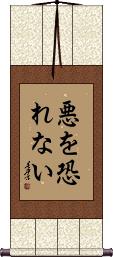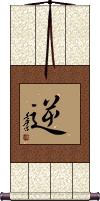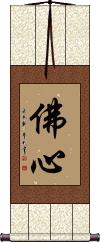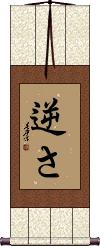Many custom options...
And formats...

Wicked in Chinese / Japanese...
Buy a Wicked calligraphy wall scroll here!
Personalize your custom “Wicked” project by clicking the button next to your favorite “Wicked” title below...
Fear No Evil
不怕邪惡 literally means “no fear of evil” in Chinese.
Chinese grammar and word order are a little different than English. 不怕邪惡 is the best way to write something that means “fear no evil” in Chinese.
The first character means “not,” “don't” or “no.”
The second means “fear.”
The last two mean “evil” but can also be translated as sinister, vicious, wickedness, or just “bad.”
Fear No Evil
悪を恐れない is “Fear No Evil” in Japanese.
Japanese grammar and phrase construction is different than English, so this literally reads, “Evil Fear Not.”
The “evil” Kanji can also be translated as “wickedness.”
Note: Because this selection contains some special Japanese Hiragana characters, it should be written by a Japanese calligrapher.
Gyaku
逆 is a Japanese Kanji that means reverse, inversion, upside down, inverted, reverse, opposite, or wicked.
Forgive and Forget
Confucian Proverb
不念舊惡 is a Chinese proverb that can be translated as “Do not recall old grievances,” or more simply as “Forgive and forget.”
The character breakdown:
不 (bù) not; no; don't.
念 (niàn) read aloud.
舊 (jiù) old; former.
惡 (è) wicked deeds; grievances; sins.
This proverb comes from the Analects of Confucius.
Buddha Heart / Mind of Buddha
佛心 means the Buddha's mind, Buddha-heart, or the spiritually enlightened heart/mind.
The Buddha Heart is detached from good and evil and other such constructs. The Buddha Heart has mercy, compassion, and loving-kindness for all sentient life, the good, the wicked, and all in between.
The heart and mind (心) are the same concepts in the ancient Orient, so you can use heart and mind interchangeably in this context.
Sakasa / Reverse
逆さ is a Japanese word that means reverse, inversion, upside down, inverted, reverse, opposite, and in some contexts (especially without the secondary hiragana character), can mean wicked.
逆さ has some significance to those practicing certain forms of Japanese martial arts.
Note: The first character is kanji (originally a Chinese character now used in Japanese) it still holds the same meaning in Chinese. However, the secondary hiragana makes this a Japanese-only entry.
Not the results for Wicked that you were looking for?
Below are some entries from our dictionary that may match your Wicked search...
| Characters If shown, 2nd row is Simp. Chinese |
Pronunciation Romanization |
Simple Dictionary Definition |
賊 贼 see styles |
zéi zei2 tsei zoku ぞく |
More info & calligraphy: Rebel / Insurgent(1) thief; robber; burglar; (2) rebel; insurgent; traitor A thief, robber, spoiler; to rob, steal, etc. |
刁 see styles |
diāo diao1 tiao |
artful; wicked |
奸 see styles |
jiān jian1 chien kan かん |
wicked; crafty; traitor; variant of 姦|奸[jian1] (noun or adjectival noun) cunning and wickedness; cunning, wicked person |
姦 奸 see styles |
jiān jian1 chien kan かん |
to fornicate; to defile; adultery; rape (noun or adjectival noun) cunning and wickedness; cunning, wicked person |
悪 see styles |
è e4 o aku あく |
Japanese variant of 惡|恶[e4] (1) wicked person; evil person; scoundrel; bad guy; (2) bad child; naughty child; brat; (prefix noun) (3) bad thing; mischief; (can act as adjective) (4) excessive; unrestrained; overindulgent; (surname) Aku |
惡 恶 see styles |
wù wu4 wu o |
to hate; to loathe; ashamed; to fear; to slander agha. Bad, evil, wicked, hateful; to hate, dislike; translit. a, cf. 阿. |
歹 see styles |
dǎi dai3 tai |
bad; wicked; evil; Kangxi radical 78 |
邪 see styles |
xié xie2 hsieh ja じゃ |
demonic; iniquitous; nefarious; evil; unhealthy influences that cause disease (Chinese medicine); (coll.) strange; abnormal wickedness; evil; wicked person Deflected, erroneous, heterodox, depraved; the opposite of 正; also erroneously used for 耶. |
魔 see styles |
mó mo2 mo ma ま |
(bound form) evil spirit; devil; (prefix) supernatural; magical (1) demon; devil; evil spirit; evil influence; (suffix noun) (2) (See 覗き魔) -crazed person; -obsessed person; fiend; (can be adjective with の) (3) dreaded; terrible; awful; dreadful; (surname) Ma 魔羅 Māra, killing, destroying; 'the Destroyer, Evil One, Devil' (M.W.); explained by murderer, hinderer, disturber, destroyer; he is a deva 'often represented with a hundred arms and riding on an elephant'. Eitel. He sends his daughters, or assumes monstrous forms, or inspires wicked men, to seduce or frighten the saints. He 'resides with legions of subordinates in the heaven Paranirmita Vaśavartin situated on the top of the Kāmadhātu'. Eitel. Earlier form 磨; also v. 波 Pāpīyān. He is also called 他化自在天. There are various categories of māras, e.g. the skandha-māra, passion-māra, etc. |
不道 see styles |
bù dào bu4 dao4 pu tao fudou; budou; butou / fudo; budo; buto ふどう; ぶどう; ぶとう |
(noun or adjectival noun) (1) (archaism) (See 無道) inhuman; immoral; unreasonable; outrageous; wicked; (2) (archaism) (See 八虐) barbarity (one of the eight unpardonable crimes, incl. killing three people in one family, or dismembering a corpse) immoral |
佞奸 see styles |
neikan / nekan ねいかん |
(noun or adjectival noun) treacherous; wicked; perverse |
佞姦 see styles |
neikan / nekan ねいかん |
(noun or adjectival noun) treacherous; wicked; perverse |
兇弊 see styles |
xiōng bì xiong1 bi4 hsiung pi kyōhei |
fierce and wicked |
兇類 see styles |
kyourui / kyorui きょうるい |
(out-dated kanji) wicked gang |
凶類 see styles |
kyourui / kyorui きょうるい |
wicked gang |
劣紳 劣绅 see styles |
liè shēn lie4 shen1 lieh shen |
evil gentry; wicked landlord |
十心 see styles |
shí xīn shi2 xin1 shih hsin jisshin |
The ten kinds of heart or mind; there are three groups. One is from the 止觀 4, minds ignorant and dark; affected by evil companions; not following the good; doing evil in thought, word, deed; spreading evil abroad; unceasingly wicked; secret sin; open crime; utterly shameless; denying cause and effect (retribution)―all such must remain in the flow 流 of reincarnation. The second group (from the same book) is the 逆流 the mind striving against the stream of perpetual reincarnation; it shows itself in devout faith, shame (for sin), fear (of wrong-doing), repentance and confession, reform, bodhi (i.e. the bodhisattva mind), doing good, maintaining the right law, thinking on all the Buddhas, meditation on the void (or, the unreality of sin). The third is the 眞言 group from the 大日經疏 3; the "seed" heart (i.e. the original good desire), the sprout (under Buddhist religious influence), the bud, leaf, flower, fruit, its serviceableness; the child-heart, the discriminating heart, the heart of settled judgment (or resolve). |
喪德 丧德 see styles |
sàng dé sang4 de2 sang te |
wicked; offending morality |
奸悪 see styles |
kanaku かんあく |
(noun or adjectival noun) (1) wickedness; (2) wicked person |
奸邪 see styles |
jiān xié jian1 xie2 chien hsieh kanja かんじゃ |
crafty and evil; a treacherous villain wicked person; evil thing |
奸險 奸险 see styles |
jiān xiǎn jian1 xian3 chien hsien |
malicious; treacherous; wicked and crafty |
姦悪 see styles |
kanaku かんあく |
(noun or adjectival noun) (1) wickedness; (2) wicked person |
姦邪 see styles |
kanja かんじゃ |
wicked person; evil thing |
悪人 see styles |
akunin あくにん |
(noun - becomes adjective with の) bad person; villain; scoundrel; wrongdoer; wicked person |
悪女 see styles |
akujo あくじょ |
(1) wicked woman; (2) ugly woman |
悪婦 see styles |
akufu あくふ |
wicked woman |
惡性 恶性 see styles |
è xìng e4 xing4 o hsing akushō |
malignant; wicked; vicious (circle); producing evil; rapid (decline); runaway (inflation) unwholesome |
惡行 恶行 see styles |
è xíng e4 xing2 o hsing aku gyō |
evil or wicked conduct evil livelihood |
極道 极道 see styles |
jí dào ji2 dao4 chi tao gokudou / gokudo ごくどう |
yakuza (adjectival noun) (1) wicked; evil; profligate; immoral; (2) wickedness; evildoing; (3) organized crime; yakuza; underworld |
死屍 死尸 see styles |
sǐ shī si3 shi1 ssu shih shishi しし |
corpse; dead body corpse Dead corpse, 'e. g. a wicked monk. |
Click here for more Wicked results from our dictionary
The following table may be helpful for those studying Chinese or Japanese...
| Title | Characters | Romaji (Romanized Japanese) | Various forms of Romanized Chinese | |
| Fear No Evil | 不怕邪惡 不怕邪恶 | bú pà xié è bu2 pa4 xie2 e4 bu pa xie e bupaxiee | pu p`a hsieh o pupahsieho pu pa hsieh o |
|
| Fear No Evil | 悪を恐れない | aku o osore nai akuoosorenai | ||
| Gyaku | 逆 | gyaku | ||
| Forgive and Forget | 不念舊惡 不念旧恶 | bú niàn jiù è bu2 nian4 jiu4 e4 bu nian jiu e bunianjiue | pu nien chiu o punienchiuo |
|
| Buddha Heart Mind of Buddha | 佛心 | busshin / bushin | fó xīn / fo2 xin1 / fo xin / foxin | fo hsin / fohsin |
| Sakasa Reverse | 逆さ | sakasa | ||
| In some entries above you will see that characters have different versions above and below a line. In these cases, the characters above the line are Traditional Chinese, while the ones below are Simplified Chinese. | ||||
Successful Chinese Character and Japanese Kanji calligraphy searches within the last few hours...









